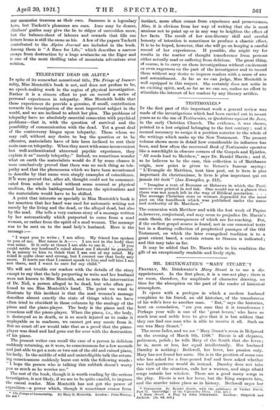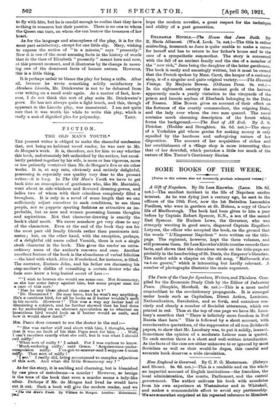MR. DRINKWATER'S "MARY STUART.1.
FBANIELY, Mr. Drinkwater'e Mary Stuart is to me a dis- appointment. In the first place, it is a one-act play; there is no room, therefore, for amplitude of character drawing, no time for the absorption on the part of the reader of historical atmosphere.
It opens with a prologue in which a modern husband complains to his friend, an old historian, of the transference of his wife's love to another man. " But," says tho historian, bent on consolation, " are you sure that it is transference 7 Perhaps your wife is one of the ' great lovers,' who have so much true and noble love to give that it is but seldom that they can find one man who is able to receive it all. Such an one was Mary Stuart."
The scene fades, and we see "Mary Stuart's room in Holyrood on the evening of March 9th, 1566." Riccio is all elegance, politeness, polish ; he tells Mary of the South that she loves ; he is, more or less, her equal intellectually. Her husband Darnley is nothing : Bothwell, her lover, has passion only. Mary has not found her mate. She is in the position of some one who has asked for a four-pound loaf and been asked whether two half-quarterns would do instead. Darnley does not take this view of the situation, calls her a wanton, and sings ribald songs outside her window. There are a good many songs in the play. Riccio is not her lover, but the King suspects him, and the murder takes place as in history. Bothwell urges her
• Tatimonies. By Bendel Harris, with the assistance of 'lecher Burch. Part II. Cambridge : at the University Press. 112s. net.) t Mary Stuart. A Play by John Drinkwatcr. London : Bldgwick and Jackson. .3s. net.]
to fly with him, but he is candid enough to realize that they have nothing in common but their passion. There is no one to whom the Queen can turn, on whom she can bestow the treasures of her heart.
As for the language and atmosphere of the play, it is for the most part satisfactory, except for one little slip. Mary, wishing to express the notion of " in a minute," says " presently." Now it is one of the most amusing facts in the history of words that in the time of Elizabeth " presently " meant here and now, at this present moment, and it illustrates by its change in mean- ing one of the dominant facts of human nature. However, this is a little thing.
It is perhaps unfair to blame the play for being a trifle. After all, because he wrote something solidly satisfactory in Abraham Lincoln, Mr. Drinkwater is not to be debarred from ever writing on a small scale again. As a matter of fact, how- ever, I do not think this sort of play suits Mr. Drinkwater's genre. He has not always quite a light touch, and this, though apparent in the Lincoln play, was immaterial. I am not quite sure that it was worth his while to write this play, which is really a sort of dignified plea for polyandry.



































 Previous page
Previous page